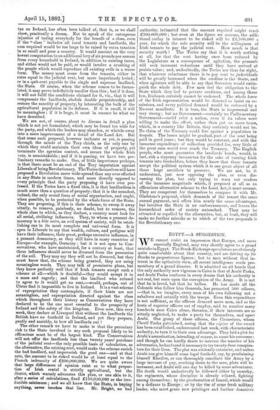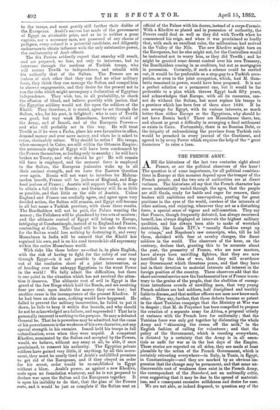EGYPT.—A SUGGESTION.
WE cannot resist an impression that Europe, and more especially England, may very shortly agree to a grand mistake in Egypt. The Stock-Exchange speculators are obviously quite comfortable about that country, and are driving up its Stocks to preposterous figures ; but to men without that in- terest in the optimistic view, all recent intelligence reads pre- monitory of a grand disaster. It is admitted on all hands that the only authority now vigorous in Cairo is that of Arabi Pasha, and Arabi Pasha confesses in every decree that his authority is not real, but rests upon the corruption of the Army. It is not that he is loved, but that he bribes. He has made all the Colonels who follow him Generals, has promoted 500 officers, —that is, we imagine, every man of his own following not a subaltern and actually with the troops. Even this expenditure is not sufficient, as the officers demand more men, and as the hosts of superior officers out of employ, said to number many hundreds near Cairo alone, threaten, if their interests are so utterly neglected, to make a party for themselves, and upset Arabi. One group of these officers, the Circassians, whom Cherif Pasha patronised, seeing that the rIgime of the sword has been established, endeavoured last week, with characteristic audacity, to turn it to their own advantage. They laid a plot for Arabi's assassination, intending, of course, to name his successor; and though he can hardly desire to increase the number of his adversaries, he has found it necessary to try twenty-four conspira- tors for their lives. The plot was evidently extensive, and unless Arabi can give himself some legal foothold, say, by proclaiming himself Khedive, or can thoroughly conciliate the Army by a large increase of pay, reaching down to the men, plots will be incessant, and Arabi will one day be killed by some adventurer. His death would undoubtedly be followed either by anarchy, the regiments, whose discipline is already relaxed, fighting among themselves ; by the proclamation of Ismail, which would be a defiance to Europe; or by the rise of some fresh military leader, who must grant new privileges and further donatives
to the troops, and must gratify still further their dislike of the Europeans. Arabi's success has made of the government of Egypt an attainable prize, and as he is neither a great captain, nor a necessary man, nor possessed of any charm of pedigree, every colonel is a potential candidate, and diligently endeavours to obtain influence with the only substantive power, the confraternity of Arab officers. The Six Powers evidently expect that anarchy will result, and are prepared, we fear, not only to intervene, but to intervene through the medium of Turkish troops, who will restore Tewfik to independence, and rebuild with his authority that of the Sultan. The Powers are so jealous of each other that they can find no other military force, they think they can manage the Sultan and compel him to observe engagements, and they desire for the present not to run the risks which might accompany a declaration of Egyptian independence. They wish, too, in all probability, to check the effusion of blood, and believe, possibly with justice, that the Egyptian soldiery would not fire upon the soldiers of the Khalif. They therefore, it is stated, agree to act through the Sultan, who, for his part, is delighted ; who is sure of Tewfik —a good, but very weak Mussulman, horribly afraid of the Army, and of Ismail, and of the European Powers— and who will probably act in this way. He will treat Tewfik as if he were a Pasha, place his own favourites in office, demand money and ever more money, and when he is asked to retire, obstinately refuse. Why should he retire ? His troops, when encamped in Cairo, are still within the Ottoman Empire; the autonomic rights of Egypt will have been condemned by the Powers themselves, as leading only to anarchy ; he will have broken no Treaty, and why should he go? He will remain till force is employed, and the moment force is employed to the Sultan, the European jealousies wake up in all their ancient strength, and we have the Eastern Question over again. Russia will not want to interfere for Mahoru- medan benefit, France will be jealous of England, and Eng- land jealous of France ; Austria will support Turkey, in order to obtain a full title to Bosnia ; and Germany will do as little as possible, and that little on the side of Austria. Unless England and France can cordially agree, and agree upon very decided action, the Sultan will remain, and Egypt will become in all but name a Turkish province, with these three results. The Bondholders will not be paid, the Palace wanting the money ; the Fellaheen will be plundered by two sets of masters ; and the ultimate control of Egypt will belong to Europe, intriguing at Constantinople, instead of to England and France, contending at Cairo. The Canal will be less safe than ever, for the Sultan would lose nothing by destroying it, and every Mussulman in India will be assured that the Khalif has regained his own, and is on his road towards his old supremacy within the entire Mussulman world.
With risks like these before us—that is, in plain English, with the risk of having to fight for the safety of our road through Egypt—is it not possible to discover some way out of the confusion short of a joint intervention, or of handing over the unhappy Egyptians to the worst Power in the world ? We fully admit the difficulties, but there is one point in the situation which has not received the atten- tion it deserves. The ultimate root of evil in Egypt is the greed of the Jew Rings which hold the Bonds, and are receiving four per cent, upon double the money they ever lent ; but another cause is the incompetence of the present Khedive. If he had been an able man, nothing would have happened. He failed to prevent the military insurrection, he failed to put it down, he fails to keep it within due bounds, and why should he not be acknowledged as a failure, and superseded ? That he is personally innocent is nothing to the purpose. So may a defeated General be. That he is powerless may be admitted, but the cause of his powerlessness is the weakness of his own character, not any special strength in his enemies. Ismail held his troops in full subordination, even when they were unpaid. A competent Khedive, nominated by the Sultan and accepted by the Powers, would, we believe, without any army at all, be able, if once proclaimed, to reassert his authority. The Egyptian private soldiers have gained very little, if anything, by all this move- ment, they must be nearly tired of Arabi's unfulfilled promises to get rid of the Europeans, and if they obeyed an order for his arrest, order would be re-established in Egypt without a blow. Arabi's power, as against a new Khedive, rests upon no foundation whatever, and he is not prepared to declare war upon the Sultan and the Europeans together. It is upon his inability to do that, that the plan of the Powers rests, and it would be just as complete if the Sultan sent an official of the Palace with his decree, instead of a corps d'arrage. With a Khedive so placed and in possession of authority, the Powers could deal as well as they did with Tewfik when he commenced his reign, and when it was proclaimed so loudly that, with such an excellent ruler, the millennium had arrived in the Valley of the Nile. The new Khedive might turn on the Europeans, but he also might not, for the Controllers would be instructed not to worry him, as they did Tewfik ; and he might be granted some decent control over his own Treasury, the Bondholders coming in as creditors, but not as mortgagors in possession. Certainly, if such a scheme could be carried out, it would be far preferable as a stop-gap to a Turkish occu- pation, or even to the joint occupation, which, had M. Gam- betta remained in power, would have been proposed. It is not a perfect solution or a permanent one, but it would be far preferable to a plan which throws Egypt back fifty years, and acknowledges that Europe, with all its resources, can- not do without the Sultan, but must replace his troops in a province which has been free of them since 1840. 11 he can arrange for Egypt, with its various interests, so much better than either Europe or the Egyptians, why should he not have Bosnia back ? There are Mussulmans there, too, and almost as great a difficulty in arranging a final settlement as exists in Cairo. Fortunately, there is no Bosnian Debt, or the iniquity of enfranchising the province from Turkish rule would be preached in every journal of the Continent, and agreed to by every Power which requires the help of the "great financiers" to raise a loan.



































 Previous page
Previous page